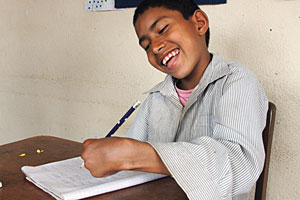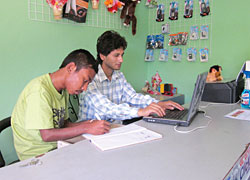 MARCUS BENIGNO |
Dipak Kayastha carefully adds 12 plus 34 and writes 46 in his workbook. Ask him his age, and he'll smile and signal '16'. Surprisingly, two years ago cerebral palsy patient Dipak had difficulty communicating his needs. Today, he's one of the many success stories at the Patan Community-based Rehabilitation (CBR) centre.
Established in 1995, Patan CBR is the only institution of its kind that serves children with neurological development disabilities, caring for over 60 children. "Sixty per cent of the cases we deal with are autism related," explains Rajesh Bajracharya. "Others have cerebral palsy and Down syndrome, and some children have multiple conditions."
With an open-door policy, the centre admits and assesses new students regardless of their age and condition. "Each child is different so we have to formulate a customised individual plans," explains teacher Kabita Shrestha. In addition to formal education, the centre focuses on Physiotherapy, speech training and socialisation.
 |
"Our children's progress is not simple as going from Class 1 to 2, but is a continuous process of learning," Shrestha adds. What is heartening is that many of the centre's former students are now studying in mainstream schools.
Patan CBR was also involved in providing door-to-door assessments of children in Kathmandu, Lalitpur and Nuwakot districts, which found that over 4.5 per cent of the population suffers from some form of disability. The centre has registered more than 1,700 children, and has trained their guardians in disability care. However, this work has been hampered by a lack of funds.
 |
"Our cost is high because our children need constant monitoring by trained staff," says Moti Shanti Shakya, President of the centre. "Our efforts are also directed towards raising awareness because a lot of these cases can be prevented or improved."
Sunita Maleku Amatya of Autism Care Nepal agrees: "Early intervention, diagnosis and treatment can have a life changing effect on children with autism, or any other neurological disability."
www.patancbr.org
A different kind of shop
 |
See also:
Coming of AGE, CLARE HARVEY


